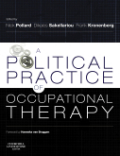
A political practice of occupational therapy
Pollard, Nick
Kronenberg, Franciscus
Sakellariou, Dikaios
This challenging and innovative book explores the political aspects of occupational therapy practice, developing this concept from the implications of occupational justice, and expanding on some of the ideas originally set out in Occupational Therapy without Borders. The book discusses how practitioners may develop political awareness in order to achieve goals in community development, or towards occupational goals, and is supported by twelve chapters of practiceexamples from the UK, US, Georgia and Australia as well as an important history of the profession as an agency for social change. Contents include significant theoretical chapters on gender, class and disability, challenges to holism, occupational literacy, and a discussion of political competence. INDICE: List of Contributors. Foreword by Hanneke van Bruggen. Preface. Acknowledgements. Introduction. Section 1: Theory. Chapter 1 - A political practice of occupational therapy (Nick Pollard, Frank Kronenberg, Dikaios Sakellariou). Chapter 2 - Political competence in occupational therapy - (Nick Pollard,Dikaios Salellariou, Frank Kronenberg). Chapter 3 - When Adam delf and Eve span: occupational literacy and democracy (Nick Pollard). Section 2: Explorations of context. Chapter 4 - Occupational apartheid (Nick Pollard, Frank Kronenberg, Dikaios Sakellariou). Chapter 5 - Three sites of conflict and co-operation: class, gender and sexuality (Dikaios Sakellariou). Chapter 6 - Political challenges of holism: hetroglossia and the (im)plausibilty of holism (Dikaios Sakellariou, Nick Pollard). Section 3: Practice. Chapter 7 - Occupational therapyfoundations for political engagement and social transformation (Gelya Frank, Ruth Zemke). Chapter 8 - Encouraging student consciousness of the political through community fieldwork (Alison J. Beck, Karin J. Barnes). Chapter 9 - Enacting pADL's in occupational therapy education: health care disparities in Oregon (Tiffany Boggis).Chapter 10 - Individual blame or systemic failure? Re-evaluating occupational disengagement in an Indigenous community (Tamar Paluch, Shana Boltin, Linsey Howie). Chapter 11 - Political practice in occupational therapy in Georgia: 'challenging change' through social action (Maria Kapanadze, Medea Despotashvili, Nino Skhirtladze). Chapter 12 - When the therapist met theevangelists. A story of the enablement of an inner-city community (Julie Coleman, Jeff and Vanessa Kirby). Chapter 13 - The Sleaford MACA Group (Catherine McNulty). Chapter 14 - The Transatlantic Fed: from individual stories of disability to collective action (Brendan Abel, Melodie Clarke, Stephen Parks). Chapter 15 - Working with asylum seekers: challenging occupational apartheid (Richard Davies). Chapter 16 - Illustrating occupational needs of refugees (Clarissa Wilson). Chapter 17 - Reflections on working with South Sudanese refugees insettlement and capacity building a regional Australia (Andrina Mitchell). Chapter 18 - Forging partnerships to address health related needs: targetting embedded rural communities in the horseracing industry (Karin J. Opacich, ShannonLizer, Peggy Goetsch). Chapter 19 - Occupational therapy with Native Americanyouth (Maggie Hotch-Heyman). Chapter 20 - Postcolonial practice in occupational therapy: the Tule River Tribal History Project (Gelya Frank, Heather J. Kitching). Chapter 21 - Facing the challenge: a compass for navigating the heteroglossic content (Nick Pollard, Dikaios Sakellariou). Index.
- ISBN: 978-0-443-10391-9
- Editorial: Churchill Livingstone
- Encuadernacion: Rústica
- Páginas: 264
- Fecha Publicación: 02/09/2008
- Nº Volúmenes: 1
- Idioma: Inglés
